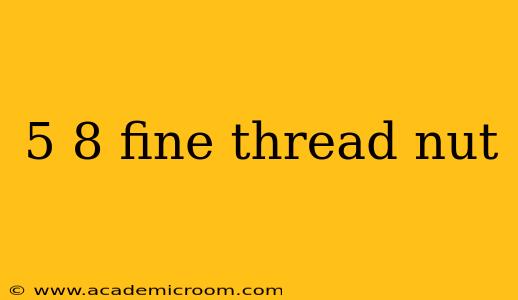Finding the right nut for your project can sometimes feel like searching for a needle in a haystack. Especially when dealing with specialized threads like 5-8 fine thread nuts. This comprehensive guide will demystify 5-8 fine thread nuts, explaining their specifications, applications, and where to find them.
What Does "5-8 Fine Thread Nut" Mean?
The designation "5-8 fine thread nut" refers to a nut designed to fit a 5/8-inch diameter bolt with fine threads. Let's break down this terminology:
-
5/8-inch: This refers to the nominal diameter of the bolt the nut is intended for. This is the approximate diameter across the bolt's head.
-
Fine Thread: This distinguishes it from a "coarse thread" nut of the same diameter. Fine threads have more threads per inch, resulting in a finer pitch (distance between threads). Fine threads are generally preferred for applications where precise alignment and a stronger, more resistant joint are needed. They are also useful in materials that are easily stripped by coarse threads.
What are the Applications of 5-8 Fine Thread Nuts?
5/8-inch fine thread nuts find use in a variety of applications, often where strength and precision are critical. Some common examples include:
-
Machinery and Equipment: Heavy-duty equipment often utilizes fine threads for increased reliability and durability.
-
Automotive Parts: Specific automotive components may require the precise fit and strength offered by fine thread nuts.
-
Construction and Engineering: Applications requiring strong, vibration-resistant fasteners frequently employ fine thread nuts.
-
Industrial Manufacturing: Many industrial processes demand components with high precision, making fine thread nuts an ideal choice.
What is the Difference Between Coarse and Fine Threads?
The key difference lies in the number of threads per inch (TPI). Coarse threads have fewer threads per inch, resulting in a wider pitch. Fine threads have more threads per inch and a narrower pitch. This impacts several aspects:
-
Strength: Fine threads generally offer slightly greater tensile strength due to the increased surface area of engagement between the nut and bolt.
-
Vibration Resistance: Fine threads are more resistant to loosening due to vibration.
-
Material Compatibility: Fine threads are often preferred when dealing with softer materials to prevent stripping.
-
Precision: Fine threads allow for more precise adjustments and alignment.
Where Can I Find 5-8 Fine Thread Nuts?
5-8 fine thread nuts are typically available at:
-
Hardware Stores: Larger hardware stores often stock a variety of fasteners, including specialized nuts like 5-8 fine thread.
-
Online Retailers: Numerous online retailers specialize in fasteners, offering a wide selection and often competitive pricing. Be sure to specify "5/8-inch fine thread nut" in your search to ensure you receive the correct item.
-
Industrial Supply Companies: These companies cater to industrial clients and typically carry a large inventory of specialized fasteners, including metric and imperial nuts and bolts.
What Materials are 5-8 Fine Thread Nuts Made From?
The material used for 5-8 fine thread nuts will vary depending on the application. Common materials include:
-
Steel: A durable and widely used material for many fastener applications. Often galvanized or otherwise treated for corrosion resistance.
-
Stainless Steel: Offers superior corrosion resistance, making it ideal for outdoor or corrosive environments.
-
Brass: A softer material often used in applications where damage to the mating threads is a concern.
-
Nylon: Used for non-metallic, non-conductive applications.
How Do I Identify a 5-8 Fine Thread Nut?
Identifying a 5-8 fine thread nut usually involves checking its dimensions and thread pitch. A reliable method is to use a thread gauge or compare it to a known 5/8-inch fine thread nut. You can also often find this information stamped on the nut itself or in the packaging.
This guide offers a comprehensive overview of 5-8 fine thread nuts, helping you better understand their specifications, applications, and sourcing. Remember to always double-check your measurements and specifications before purchasing to ensure a proper fit for your project. Using the correct fastener is vital for the safety and functionality of your project.
